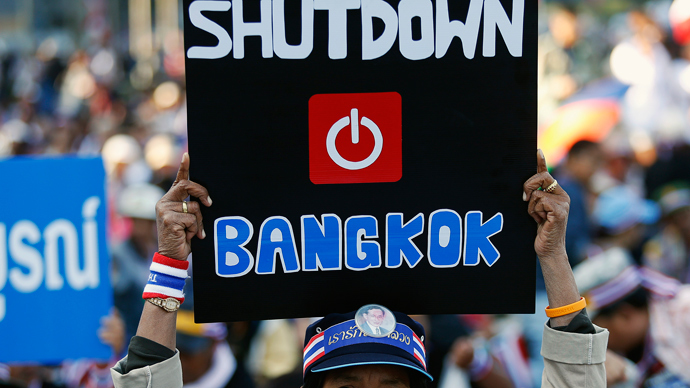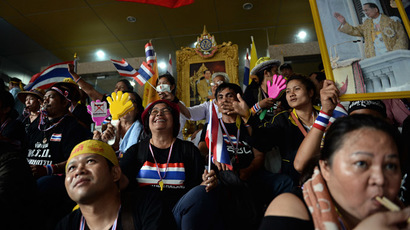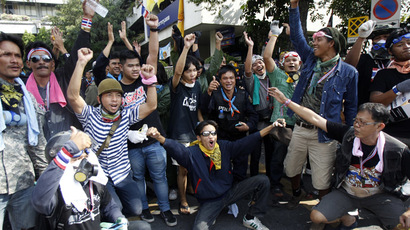Thai protesters 'shut down' Bangkok in bid to oust PM

Thousands on Monday blocked roads leading to the heart of Thailand’s capital, Bangkok, in a bid to force out Prime Minister Yingluck Shinawatra and replace her with a transitional government, calling the operation “Bangkok Shutdown.”
Thousands came out onto the streets, walking past barricades, waving flags and wearing t-shirts with the above slogan, occupying all the strategic intersections, which included a shopping mall – the same one that was set on fire during the political turmoil of 2011.
Protests are led by the former opposition politician, Suthep Thaugsuban. Demonstrators are seeking to cause gridlock in the city of 12 million people by blocking major intersections. Late on Sunday, he told the crowds that the group intends to “fight regardless of whether [they] win or lose.”
“We will not compromise or accept negotiation," he added.

As of Monday morning, there has been little traffic on the main roads of the Thai capital, probably because many residents and workers stayed home, the Bangkok Post reports. The protesters said the government can count on them trying to disrupt people’s work commutes. This concerns government workers especially, as the crowd promised to cut off power to those institutions.
This is something that the government warns could lead to more bloodshed.
The recent demonstrations that swept the south-east Asian nation are just the latest intensification of an eight-year conflict between the middle class and royalist establishment and the mostly poorer, rural supporters of the prime minister and her self-exiled brother, former premier Thaksin Shinawatra.
The continuing protest comes amid Monday calls by the PM to gather anti-government protesters and political parties under one roof to discuss an Election Commission proposal for further postponing the election, initially proposed for February 2, according to a senior government aide.
The opposition and the ministers had previously disagreed with the plan. One EC member now suggests May 4 as the date.
"The prime minister thinks that there are still some unclear points in the EC's proposal. The best way is to meet and discuss it," secretary-general to the PM, Suranand Vejjajiva, told the press, Reuters said.
In 2006 Thaksin was ousted as prime minister in a coup and currently is in a self-imposed exile in Dubai, evading a possible prison term in Thailand on corruption charges.

The escalation of violence in recent weeks has seen eight people killed, including two police officers, and many others wounded.
In light of the protests, 140 schools are to be closed on Monday along with universities around the areas of the demonstration.
There will also be 10,000 police officers and 8,000 soldiers to guard the government officers.

Some feel that the action taken by the protesters could reduce support for the opposition among the capital’s residents. "Of course it affects me -- I'm very stressed," hair salon owner Tong, 69, told AFP, adding that "no customers are coming now as my regular customers cannot drive here."
Thaksin supporters also staged a rally on Sunday in several regions of Thailand, but stayed away from Bangkok.

He did warn that he will stop his attempts if the situation reaches civil war. "If it becomes a civil war, I will give up. People's life is precious for me," the Sunday Nation newspaper quoted him as saying.
The opposition’s main goal is to minimize and eliminate the Shinawatra family sway over Thai politics.
"Suthep is only a proxy for arch-royalist interests. His role has always been to bring out crowds to create popular legitimacy which might facilitate any judicial or military intervention," Reuters quoted Director of Research at the Institute of South East Asian Affairs in Chiang Mai, Paul Chambers, as saying.
The protests gained strength in November when the government tries to pass a political amnesty that would allow Thaksin to return avoiding the jail sentence. The bill was later withdrawn.














